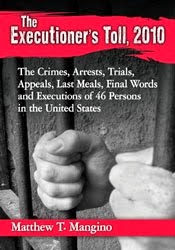The 15th execution of 2020
Orlando Hall was executed just before midnight on November 19, 2020 after
the Supreme Court allowed the Justice Department to move forward with his
federal death penalty.
Hall’s scheduled execution for 6 p.m. at
the federal prison in Terre Haute, Ind., was delayed by several last minute legal
filings that sought to halt his killing.
Hall, 49, became the eighth person executed by the
U.S. government since the Trump
administration pushed to resume federal executions for the first time in 17 years.
The Justice Department has carried out more lethal injections in the past four
months than the total number the federal government executed over the previous
three decades.
The timing of the planned executions comes as
President-elect Joe Biden is set to take office in January. Biden opposes the
death penalty, and his campaign has said he will work to pass legislation to
eliminate capital punishment at the federal level.
The Supreme Court order — which overturns a
district judge’s earlier order the same day that had temporarily blocked Hall’s
execution — follows legal
battles over the Justice Department’s lethal-injection procedures announced
by the Trump administration last year. Officials cited the need to carry out
lawful death sentences and emphasized the nature of the crimes.
Hall was convicted of kidnapping, raping and
murdering 16-year-old Lisa Rene in Arkansas in 1994. A second death-row inmate,
Brandon Bernard, is set to be executed on Dec. 10, and also asked the court to
delay his date. Bernard was convicted of killing two youth ministers on a
military reservation in 1999.
In a separate case, a federal judge on Thursday
postponed until at least Dec. 31 the execution of a third death-row
inmate, Lisa
Montgomery, who would be the first woman put to death by the federal
government in nearly 70 years. U.S. District Judge Randolph D. Moss said
Montgomery’s longtime lawyers, who became
infected with the coronavirus after traveling to visit Montgomery in prison,
should have time to recover to prepare her clemency application.
“The ongoing pandemic and the illness of Plaintiff’s
long-serving, experienced counsel pose significant hurdles” to Montgomery’s
effort to petition the president to commute her death sentence to life in
prison.
Montgomery was convicted in 2007 of strangling a
woman who was eight months pregnant and kidnapping the baby, who survived the
attack.
If all three inmates are executed before the end of
Trump’s term, there will be an estimated 52 prisoners remaining on federal
death row, according to the Death Penalty Information Center.
John H. Blume, director of Cornell Law School’s
Death Penalty Project, anticipates a change in policy once Biden takes office
in January. Blume expects Biden will impose a moratorium on federal executions,
call for a study of the death penalty, and depending on the outcome, commute
some death row sentences to life sentences.
“It’s not a huge mystery,” Blume said. Biden and his
attorney general “will have immediate control and I would think once the
president-elect becomes president that federal executions will cease.”
The refusal to stop Hall’s execution on Thursday was
not surprising. The Supreme Court has repeatedly turned down requests to block
the Justice Department’s plans to resume executions.
In a filing to the Supreme Court, Hall’s attorneys
told the justices that the government should not rush to execute a federal
prisoner in the middle of a pandemic that makes it difficult for Hall to work
with his legal team and seek clemency. Leaders of the Congressional Black
Caucus also urged Attorney General William P. Barr to pause all scheduled
executions, saying the process imposes “an unnecessary health risk” of a coronavirus outbreak by requiring officials to travel
and gather at the prison facility in Indiana.
A spokeswoman for Barr declined to comment on the
letter.
The Office of the Solicitor General asked the court
to allow the execution to proceed.
“The public and the victim’s family have an
overwhelming interest in implementing the capital sentence recommended by a
jury a quarter-century ago against petitioner, who perpetrated a heinous series
of crimes against a child, has had notice that he faces execution for the past
25 years, and has been able to file a clemency petition for the past 13 years,”
the government said in its filing Thursday.
Attorneys for Hall and Bernard also asked the
justices to halt the executions to give the court time to review fresh legal
challenges to the lethal injection protocol that uses one drug, pentobarbital.
The D.C. Circuit ruled Wednesday that the government’s
methods are unlawful because the Bureau of Prisons is using the drug without
the required prescription. Although the appeals court set aside the
government’s protocol, two of the three judges on the panel declined to block
the upcoming executions.
The D.C. Circuit said the prisoners had not shown
the requisite “irreparable harm” from the government’s failure to comply with
the prescription requirement.
Lawyers for the prisoners told the justices that
their clients will face “irreparable harm” if they are executed in a way that
“greatly increases their risk of suffering excruciating pain before death.”
Without a prescription and supervision by a medical professional, who could
pair the drug with a separate pain-reliever such as fentanyl, the lawyers said
the inmates’ risk of severe pain is increased.
Acting solicitor general Jeffrey B. Wall told the
justices in a court filing there is no “logical basis” for stopping the
executions after the court already rejected similar challenges. The death
sentences before the court, he wrote, “were imposed for heinous federal crimes
committed more than 20 years ago” and family members of the 16-year-old victim,
he said, were waiting in Terre Haute to witness the execution.
The government says the prescription requirement in
the law does not apply to lethal-injection drugs and the absence of a
prescription does not create the type of harm that merits an injunction
blocking the executions.
The prescription requirement is intended to ensure
that drugs are “safe and effective,” but the government says, a
lethal-injection drug could never meet that standard because “its intended use
is to cause death to effectuate a capital sentence, not provide therapeutic
benefits.”
Pentobarbital has “long been used for anesthesia and
euthanasia without reports of severe pain” and states have used single-drug
pentobarbital protocols to “ ‘carry out over 100 executions, without incident,’ ”
according to the government.
To read more CLICK HERE







